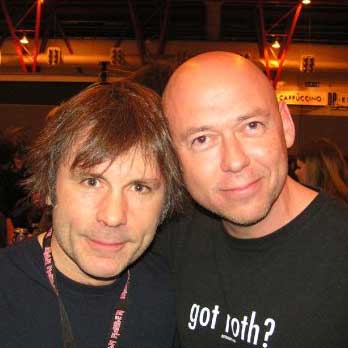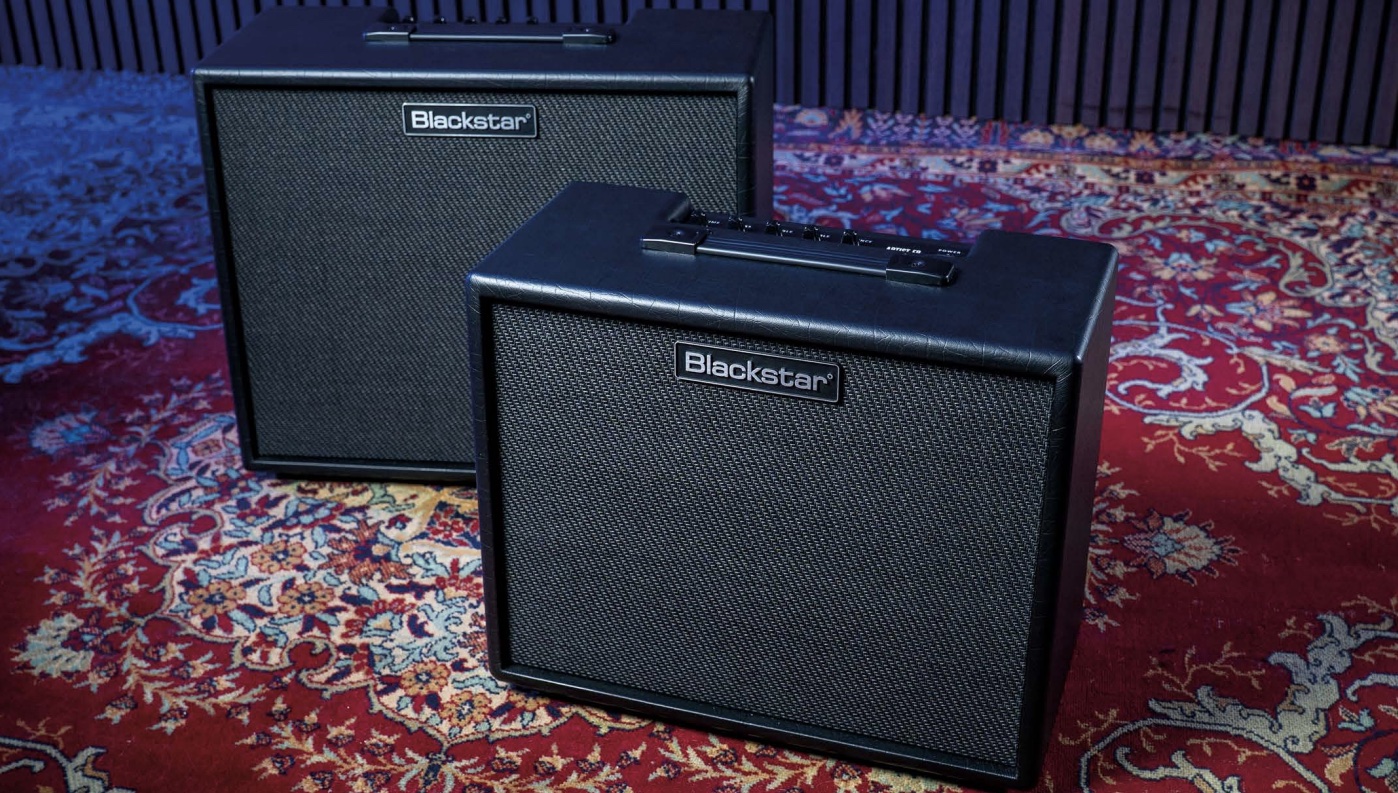Angus Young on life in one of the world's biggest rock bands: an in-depth interview with the AC/DC icon
"It’s a little bit late for us to do ballads. Rock is what we do best"
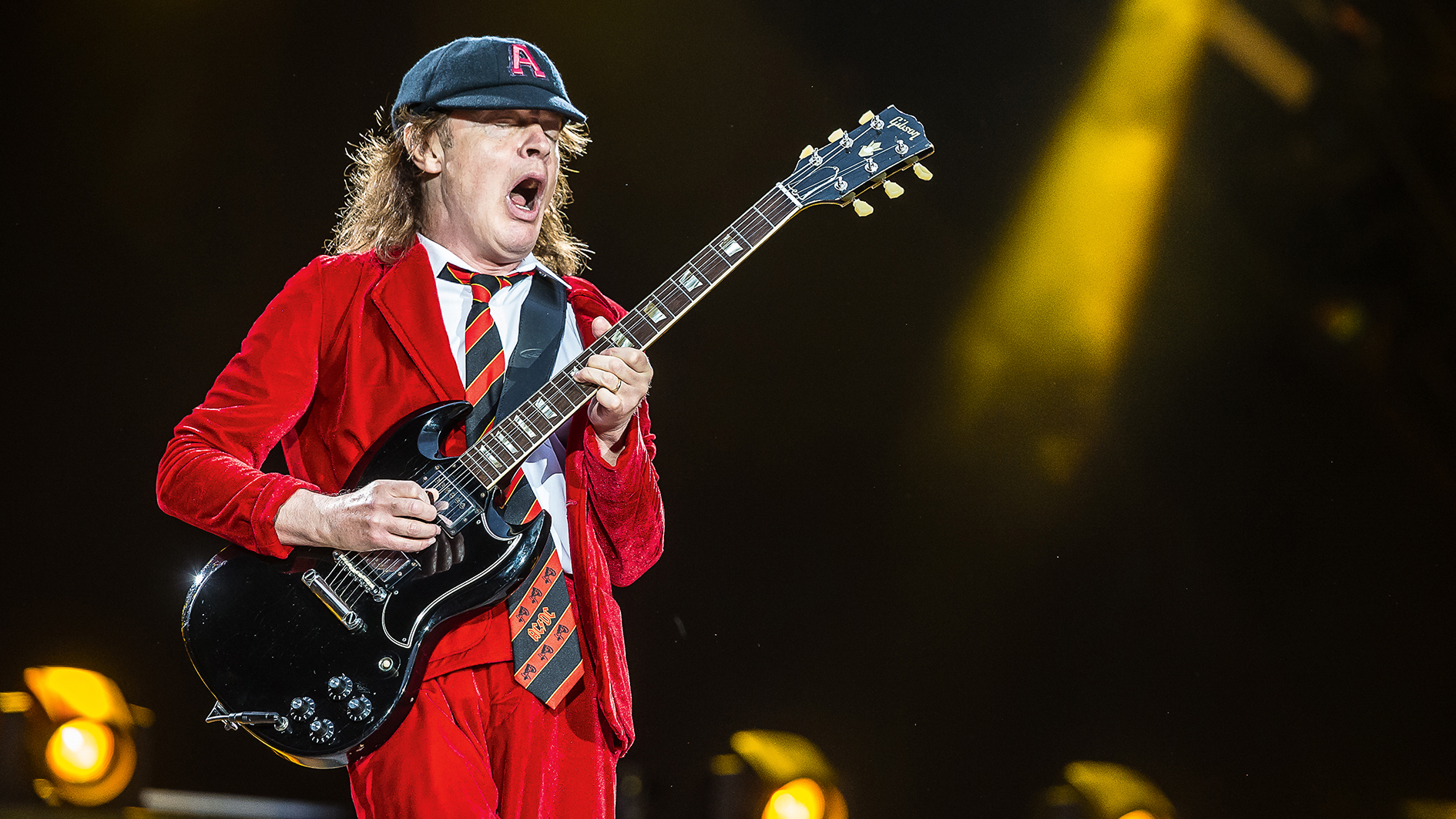
Angus Young is a rock ’n’ roll legend, but not a man to take himself too seriously. As he once said of his art: “You don’t go to the butcher for brain surgery.”
Born on March 31st, 1955 in Glasgow, the youngest of eight children, Angus was just eight years old when his family emigrated to Australia, and it was in Sydney, in 1973, that he and his older brother Malcolm, rhythm guitarist, formed AC/DC.
The band went on to sell more than 200 million albums worldwide, including 50 million of Back In Black.
The death of Malcolm Young on November 18, 2017 left Angus as the last remaining founder member of AC/DC. But it was Malcolm’s wish that the band carried on, banging out loud, raw rock ’n’ roll, just as they always did. And as Angus said: “I enjoy playing. That’s what keeps me going.”
What first turned you on to rock ’n’ roll?
"The sound of Chuck Berry’s guitar. It’s everything rolled into one: it’s blues, it’s rock and roll, and it’s got that hard edge to it. To me, that’s pure rock ’n’ roll. It’s not clean - it’s nasty."
Did playing guitar come easily to you?
All the latest guitar news, interviews, lessons, reviews, deals and more, direct to your inbox!
"As a kid, I was never one for the tennis racket. I was more interested in getting my fingers round the guitar neck, because when I was little - I’m little now, but I was ‘little’ little - getting a hand around the neck was a big thing. That was the hardest part."
I got into a lot of trouble when I was young. I wouldn’t say I was a budding bank-robber or anything, but I was a bit of a juvenile delinquent
What do you remember of those early days, when you were just a regular schoolboy like all the others?
"I didn’t go to school much. I was prize truant. When I went in it was like, ‘Welcome, Mr. Young! A year is a long holiday, you know?' The first day I went to that school, we all went to assembly and the headmaster dragged all the boys who’d been caught smoking up on the stage in front of the whole school. Of course Malcolm was one of them."
So, you were always a naughty boy then?
"I got into a lot of trouble when I was young. I wouldn’t say I was a budding bank-robber or anything, but I was a bit of a juvenile delinquent."
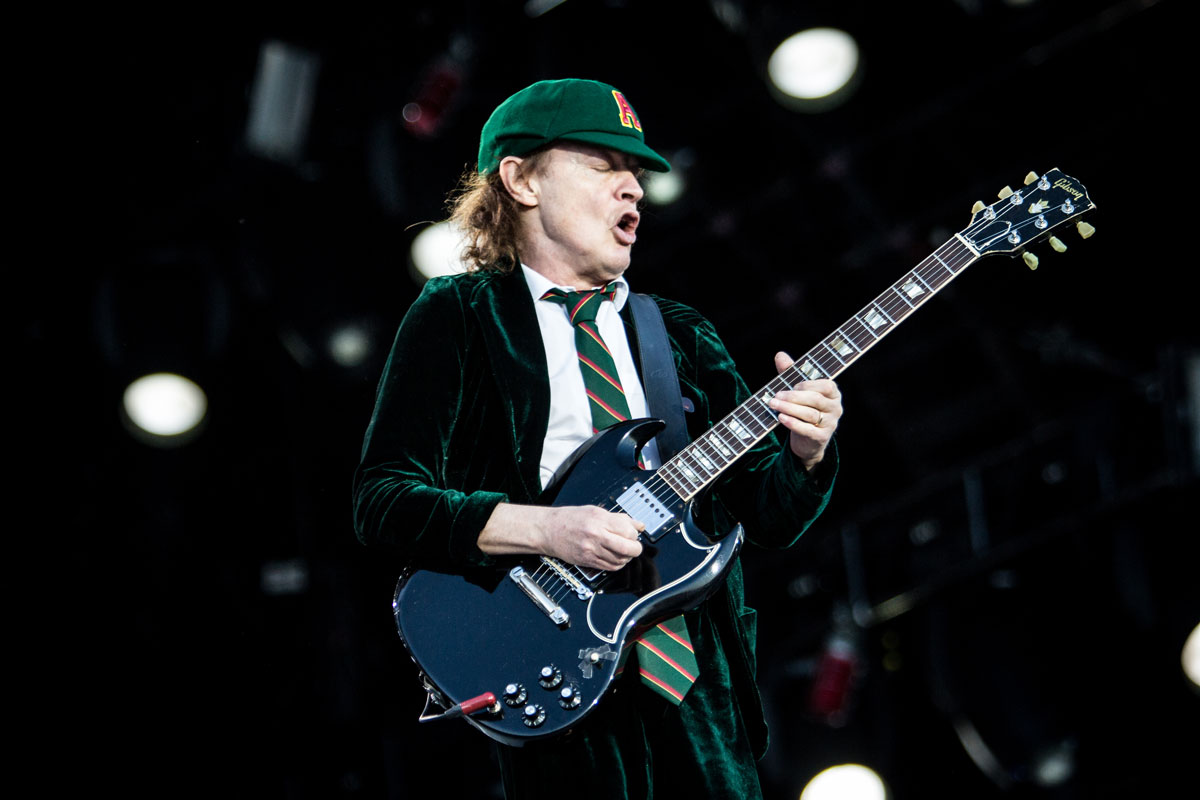
You also got into blues music at an early age. What did you love about it?
"It’s the emotion in those old blues records. I’ve never really been into the depression stuff. I’ve always liked the happy sort of blues music, like Muddy Waters. Even though he might have been singing about his woman running off with a nineteen year-old bus driver from Florida, there would be an element of humor in it, and that’s what I’ve always loved.
"I’ve never been a great lover of the real sad element of the blues. There are some great sad songs, but I prefer the happier side. And the grammar in blues music is fantastic.
"Some of the things that Muddy would sing: ‘I just love them pretty womens, I’ll kill for them young pretty things.’
"They’d sing ‘whummen’ instead of women, and ‘choo’ instead of you. But you get what they mean."
I had just one thing on my mind: I didn’t want to be a target for blokes throwing bottles. I thought if I stand still I’m a target. So I never stopped moving
When you and Malcolm formed AC/DC, with Dave Evans as the singer, were you thinking big?
"Early on, we always thought we’d be lucky if we got past the first week!"
There was a defining moment in April 1974 when AC/DC appeared at an open-air concert in Sydney’s Victoria Park, and you wore your old school uniform on stage for the first time...
"That was the most frightened I’ve ever been on stage, but thank God, I had no time to think. I just went straight out there. The crowd’s first reaction to the shorts and stuff was like a bunch of fish at feeding time - all mouths open.
"I had just one thing on my mind: I didn’t want to be a target for blokes throwing bottles. I thought if I stand still I’m a target. So I never stopped moving. I reckoned if I stood still I’d be dead."
The band played on the Aussie pub circuit, where audiences were notoriously tough. How scary was it?
"Some of the places we played were worse than toilets, let me tell you, and there was that much scrapping going on, you were behind the amps!
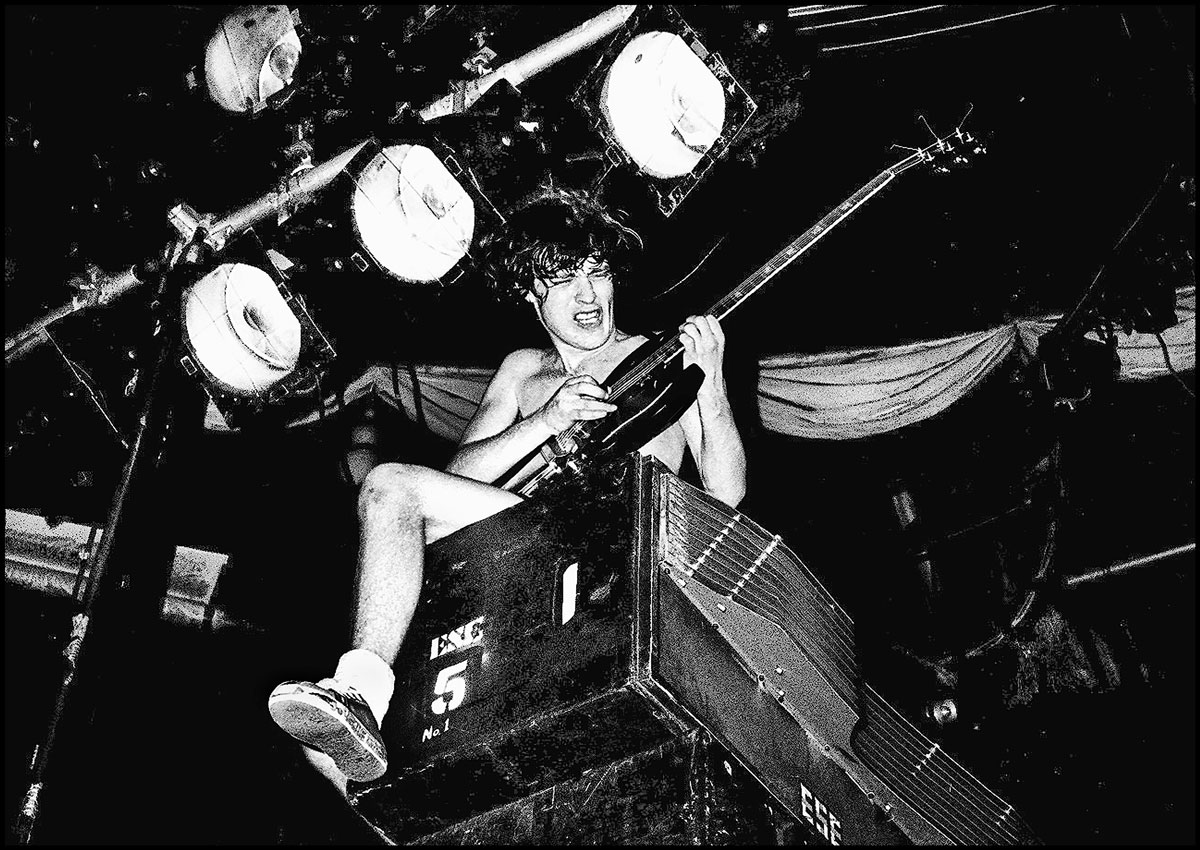
"When I was at school and there was a dance with a band, it was always a band like Van Halen, with the guy with the long blonde hair wiggling his hips.
"In the pubs we played in, in front of that hot, sweaty, beer-swilling crowd, you couldn’t even hope to do that. This was the kind of audience you couldn’t even tune your guitar to. If you bust a string, that was it.
"Sometimes you finished with just two strings, because there was no way they were going to put up with a couple of minutes of you fixing the guitar.
"I remember one night I said to the rest of the band, ‘I’m not going out there.’ The police couldn’t get in the place. There was some madman running around inside the hall with a meat cleaver, chopping into the people! And the front row was all bikers. I said, ‘They just want blood!’
"You looked out and it was just like murderers’ row, and the look on their faces is like, ‘Send us the little guy in the shorts!’"
Is it true that Malcolm once had to ‘assist’ you in getting on stage?
Sometimes you finished with just two strings, because there was no way they were going to put up with a couple of minutes of you fixing the guitar
"Yeah. Suddenly I just felt a boot and I was on. And there’s this deathly silence. All you can do is play - and pray! You put your head down and hope a bottle doesn’t come your way. That became part of my stage act. I learnt to duck and keep moving.
When Bon Scott became AC/DC’s singer in 1974, he’d already been around the block a few times with various bands, and had a taste for the rock ’n’ roll lifestyle. What did you make of him back then?
"Bon joined us pretty late in his life, but that guy had more youth in him than people half his age. That was how he thought, and I learned from him. Bon used to say to me, ‘Whatever I do, you don’t.’
"Oh, I had a few wild nights over the years, but most of the time everyone else was having them for me. Because of the schoolboy uniform, some women have tried to mother me - they think I’m cute because I’m so short. But playing has always been the thing for me.
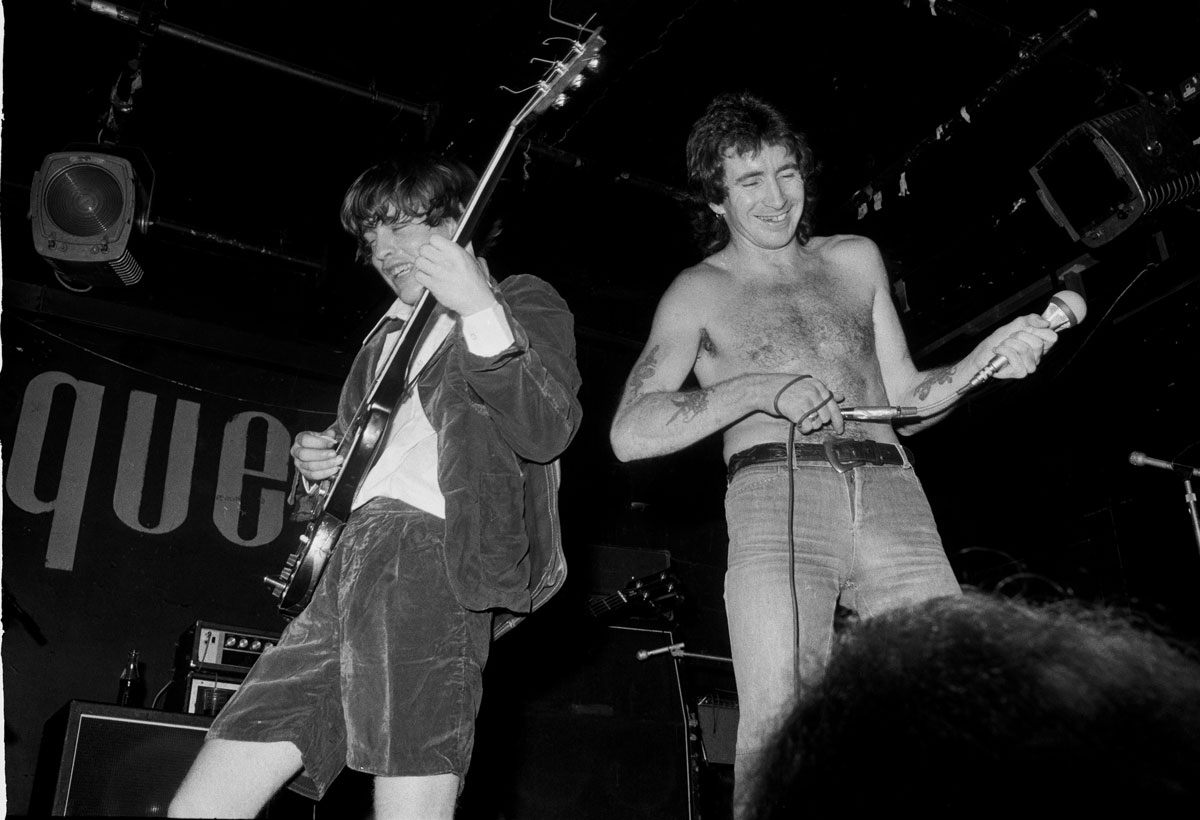
"I never really looked beyond the next gig. In the early days, all my mates used to say to me, ‘You must be meeting loads of girls...’ Well yeah, I used to meet plenty of girls, but none of them used to want to go home with me.
"Some women would come up and make, er, bold statements, but I don’t know why. There’s nothing sexy about a schoolboy, is there?"
In the summer of 1976, when the band first played in the UK, it was during a performance at the Reading Festival that you first treated an audience to something that would become a tradition - a little on-stage striptease. What prompted you to do this at Reading?
"Some blonde girl walked real slow across the photo pit right in front of the stage and thirty thousand eyes went with her. It was a real showstopper. Malcolm said to me, ‘You gotta do something to get the crowd’s attention back!’ So, I dropped my trousers.
And ever since, you’ve had AC/DC audiences singing ‘Get ’em off!’
"I always thought they were singing, ‘Get ’im off!’"
Malcolm said that it was Bon’s voice, and his witty lyrics, that gave the band its ‘flavor’.
"Bon called himself a ‘toilet wall graffitist’. He was full of compliments about himself! But he could conjure a story from anything.
My dad took my knife off me when I was four. Just having a guitar was bad enough, I suppose
"She’s Got Balls was about his first wife. And he did say he wrote Problem Child for me, but you now, I never owned a knife like it says in the song. My dad took my knife off me when I was four. Just having a guitar was bad enough, I suppose. But yeah, Bon summed me up in two words!
"He could have used one word...
"That’s right (laughs). With four letters!"
On April 30th, 1978, AC/DC played at the Apollo theatre in Glasgow, the city where you and Malcolm were born. And from that came one of the greatest live albums ever made: If You Want Blood You’ve Got It.
"It was the magic show. One night, guitars out of tune, feedback, singer farting, whatever..."
In 1979, the band had its first million selling album with Highway To Hell.
"That was the album that broke us in America."
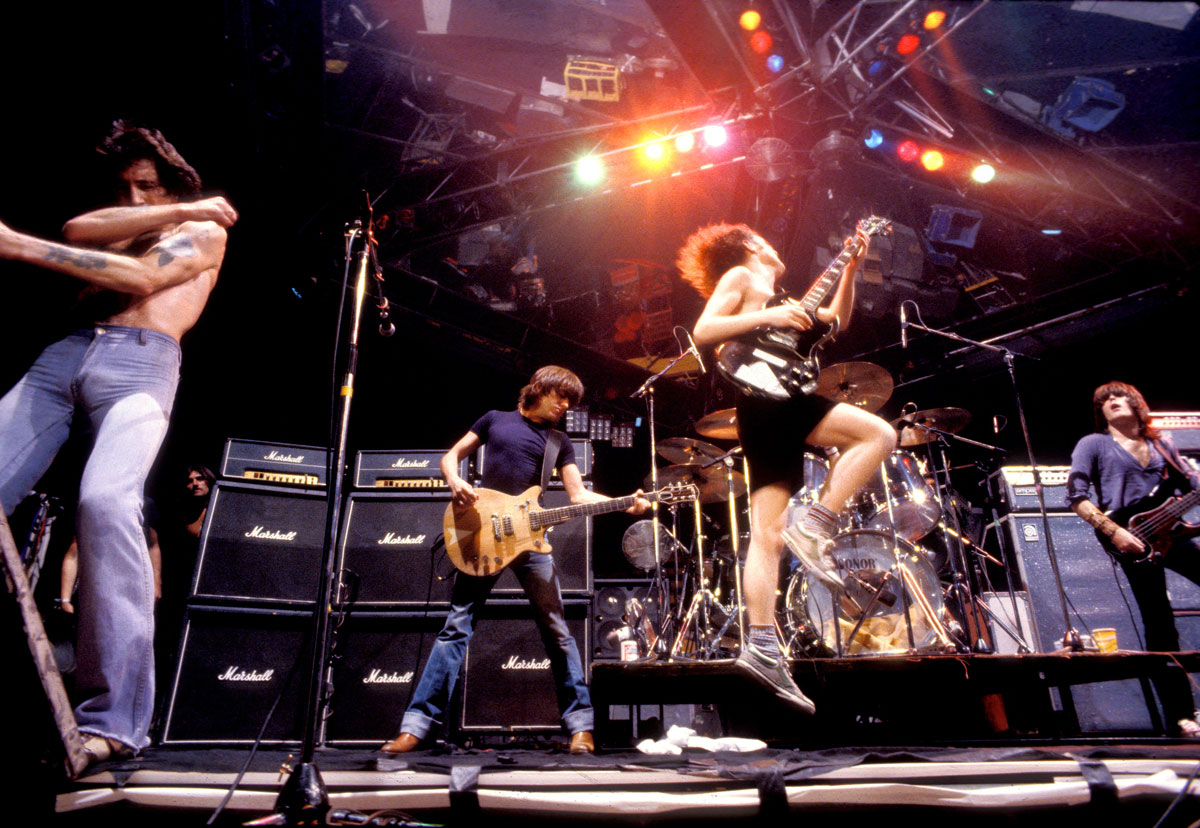
But the album’s title provoked outrage among America’s so-called ‘moral majority’ - as did the cover, on which you were pictured with devil horns and a forked tail. What did you make of the controversy?
"As soon as we called the album Highway To Hell, the American record company immediately went into a panic. With religious things, I thought everywhere was like Australia. There, they call them Bible-thumpers, and it’s a limited species, very limited!
"Christianity was never a popular movement. It’s that convict background! But in America, you had guys in bed sheets and placards with prayers on, picketing the gigs.
"I said, ‘Who are they here for?’ And they said, ‘You!’ And we had that thing - that if you play the record backwards you get these Satanic messages.
As a person, Bon stared death in the face a lot. The way he said it was, ‘One day you gotta go. You gotta be a stiff'
"F*cking hell, why play it backwards? It says it right up front: Highway To Hell!"
After the Highway To Hell tour, you, Malcolm and Bon got together in London to begin working on the album that would become Back In Black. How much of it was written with Bon?
"Bon wrote a little of the stuff , a week before he died. We started writing the music with Bon on drums. He was a drummer originally. He’d bang away while me and Malcolm worked out the riffs."
When Bon died in February 1980, after one too many drunken nights, had you feared that his life might end that way?
"As a person, Bon stared death in the face a lot. The way he said it was, ‘One day you gotta go. You gotta be a stiff.’"
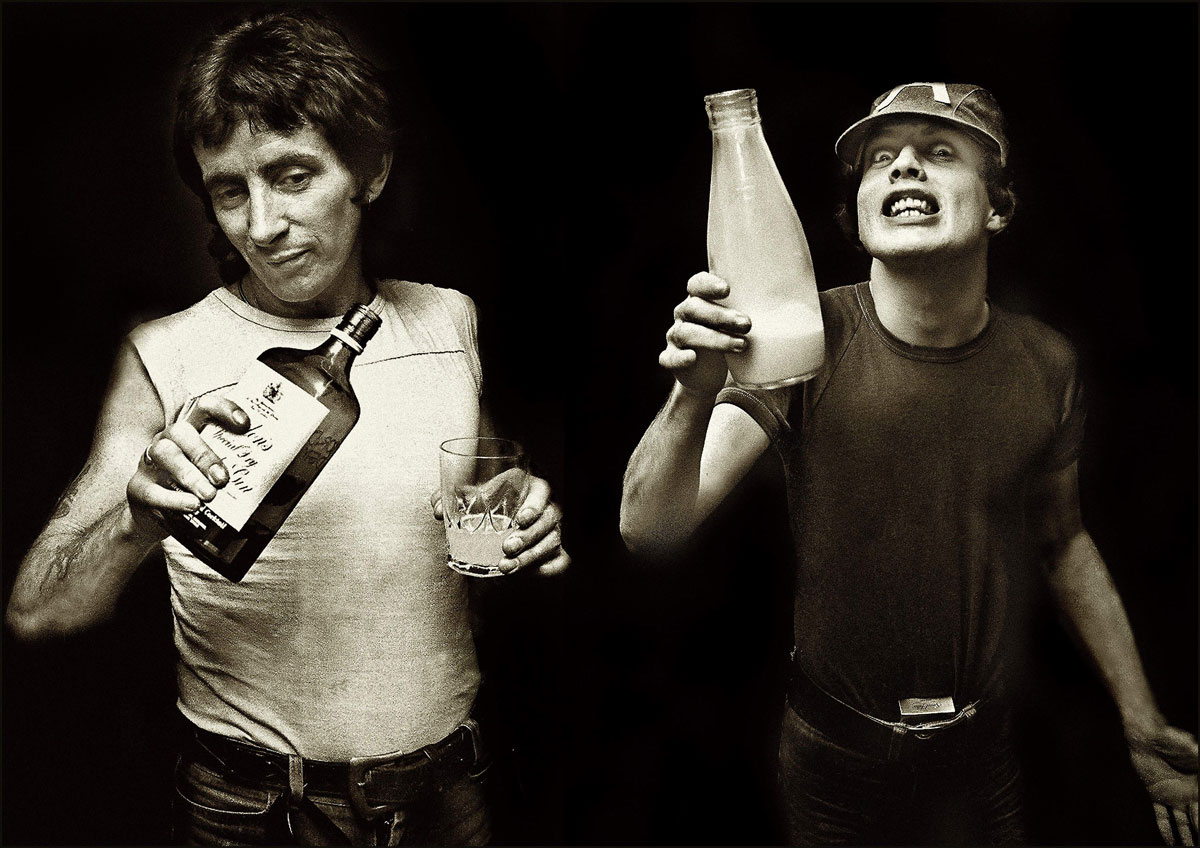
Did you feel, as most AC/DC fans did, that Bon was irreplaceable?
"Well, when we auditioned singers, they'd say, 'How am I supposed to sing over all this volume?' We said, 'We don’t want you to sing - we want you to scream!’"
You certainly found the right man for the job in Brian Johnson.
"Yeah. I always said he sounds like somebody dropped a truck on his foot. And, like Bon, Brian had a good sense of humor."
On the simplest level, Back In Black was a great rock ’n’ roll record. But on a deeper level it was, as you described it, a memorial.
"The whole Back In Black album was our dedication to Bon. That’s why the album cover was pure black, and why the album starts with a bell ringing, something sombre and different to anything else we’d done."
We play rock music. It’s a little bit late for us to do a ballad. Rock is what we do best
Was this album also Brian’s finest hour?
"Brian has recorded a lot of strong stuff with the band - the Back In Black album especially, and For Those About To Rock, which still gives me goosebumps."
After all that this band has been through, can you explain its longevity?
"People have said we’ve hung around long enough! But some bands fade when they try to adapt to what’s current. We play rock music. It’s a little bit late for us to do a ballad. Rock is what we do best.
"Sometimes I’m asked if I want to play music other than AC/DC. Sure, at home I play a little blues, but after five minutes I’m like, 'sod this!' And I’m playing hard rock again.
From the start, you’ve played it simple, straight-up hard rock ’n’ roll, nothing fancy...
"It’s a challenge to keep coming up with songs of the calibre of Let There Be Rock, Highway To Hell and Back In Black. Every song we write has got to stand up. Most of our stuff is just about sex, as is most rock music. It’s pretty hard to write a song about your dog.
"But I’ve never really found a sexual thing in music. I’ve never found anything sexy that was meant to be sexy.
"Now, that’s a good Freudian thing. But if you go back to the blues, that’s the standard tempo in most of the strip joints, and that’s what we rely on too. It has to be earthy."
Have you kept up with modern music?
"Nah. When I get in a car, the first thing that goes in is a Muddy Waters tape, even though I’ve played in four hundred times. I love that and Chuck Berry. Nowadays everything sounds so nice - buzz-free, hiss-free. I like that hiss! I like to hear the valves on the amplifier warming up. It’s pure energy.
"I still spend hours sitting and listening to the sound Chuck Berry’s guitar makes. There’s not a day that goes by when I don’t pick up a guitar. And I’m getting there - I’ve got two fingers going now!"
What you learnt the hard way in the early '70s - to go on stage and keep moving - is something you’ve done ever since. How do you keep it up?
I wouldn’t like to be the ‘Angus Young on stage’ all the time. I’d be burnt out inside a week
"After a show I just wind down for a couple of hours. I try to hide, just in case somebody grabs me and says, ‘Hey, you didn’t play this song tonight!’ I need time to relax. I wouldn’t like to be the ‘Angus Young on stage’ all the time. I’d be burnt out inside a week.
"On one American tour my weight went down to ninety-four pounds, and I was a hundred and nine pounds when we started."
Do you still get nervous before a show?
"Sometimes it is frightening. But you’ve got to psych yourself up a bit, give yourself a good kick up the ass. Usually, once I’ve got the uniform on, I’m okay. I’m on edge, nervous, but I’m not in a panic.
"At least I don’t have to put on make-up. I sport my own pimples.
"And some nights I’m in stitches when I’m trying to be The Schoolboy. But because of nerves, I’ve tripped over and even forgotten to do my zipper up a few times. I go for a pee and forget.
"Last thing before I go on stage, I always go for a p*ss and then have a cigarette. If you ever see my shorts smoking, you know I didn’t put it out right!"
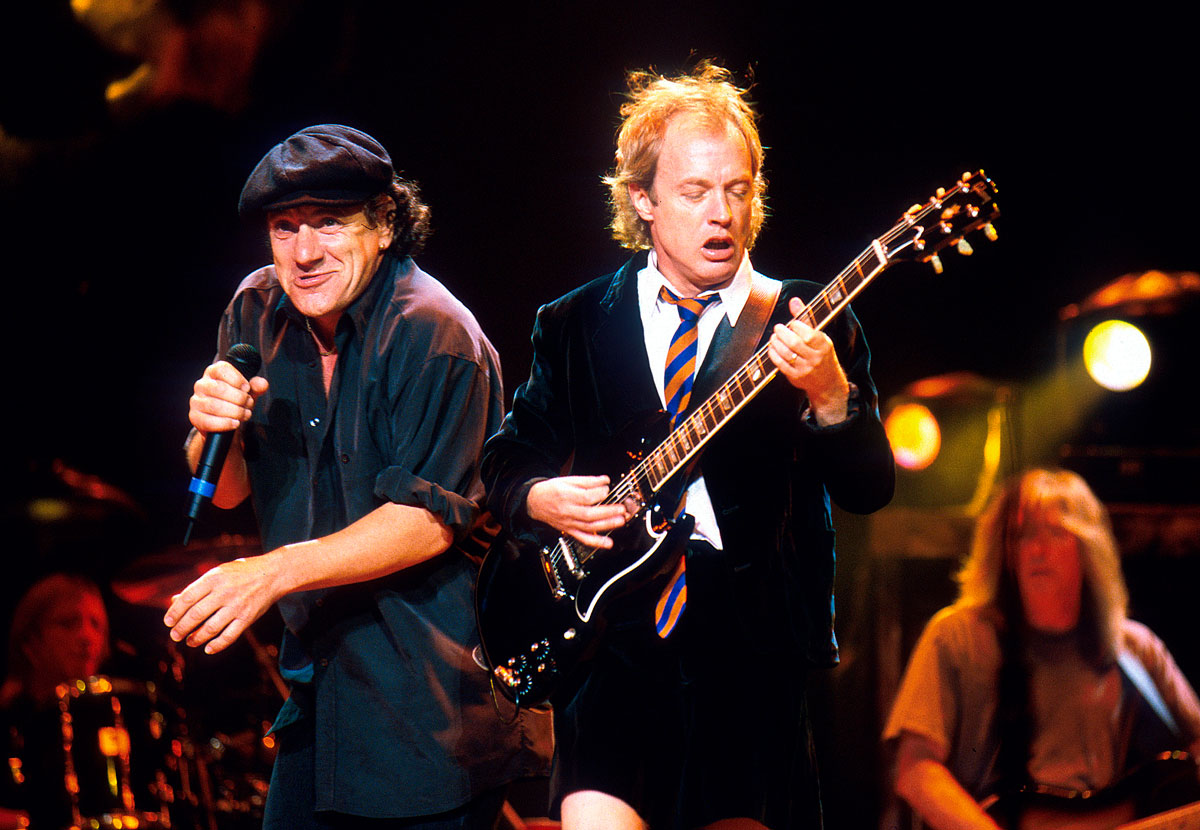
How do you feel when you’re up there on stage?
"I’m on my own little cloud. Adrenaline takes over. It’s like when you take off in an airplane. It’s exhilarating. When you’re firing well, it’s the best feeling in the world. And when it goes wrong, it’s like someone’s shoved a red-hot poker up your backside.
"But for me, the shows go so quick. You’re on and you’re off, and then you have to go back to how you are as a person. That’s the hard part, because once you go into being The Schoolboy it’s pretty hard to come off it. I’m like two different people - sometimes three!"
I like to hear the valves on the amplifier warming up. It’s pure energy
Who’s the third?
"That’s what I’m trying to figure out! I’ve been up there playing and thinking, what are those feet doing? I’m watching them to see which way they want to go. That’s all I ever do, follow the feet and the guitar. The duckwalk comes naturally.
And it’s still the best feeling in the world?
"Yeah. When I put the uniform on, and the legs start shaking... I’m ready."
Content Editor at Total Guitar and freelance writer for Classic Rock since 2005, Paul Elliott has worked for leading music titles since 1985, including Sounds, Kerrang!, MOJO and Q. He is the author of several books including the first biography of Guns N’ Roses and autobiography of bodyguard-to-the-stars Danny Francis, and has written liner notes for classic album reissues by artists such as Def Leppard, Thin Lizzy and Kiss. He lives in Bath, UK – of which David Coverdale recently said, “How very Roman of you!”


